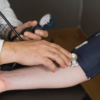Ayurvedic Treatments for Varicose Veins: Embrace Natural Healing
Ayurvedic Treatments for Varicose Veins: Embrace Natural Healing are a common and often bothersome condition characterized by enlarged, twisted veins that are usually visible just beneath the surface of the skin. They typically occur in the legs and can cause discomfort, pain, and aesthetic concerns. While conventional treatments such as compression stockings, sclerotherapy, and laser therapy are widely known, Ayurveda, the ancient system of medicine from India, offers a range of natural remedies and lifestyle changes that can help manage and improve varicose veins.
Understanding Varicose Veins

Before diving into Ayurvedic treatments, it’s essential to understand what causes varicose veins. They occur when the valves in the veins that help blood flow towards the heart become weakened or damaged. This causes blood to pool in the veins, leading to their enlargement and the characteristic blue or purple appearance.
Several factors contribute to the development of varicose veins, including:
- Genetics: A family history of varicose veins increases your risk.
- Age: The risk increases as you age due to the weakening of vein walls.
- Gender: Women are more likely to develop varicose veins, partly due to hormonal changes.
- Pregnancy: Increased blood volume and hormonal changes can exacerbate the condition.
- Obesity: Excess weight puts additional pressure on veins.
- Sedentary Lifestyle: Prolonged periods of sitting or standing can affect circulation.
Ayurveda: An Overview
Ayurveda, meaning “the science of life,” is a holistic approach to health that aims to balance the body’s three doshas (Vata, Pitta, and Kapha) and promote overall well-being. It incorporates a variety of treatments, including herbal remedies, dietary recommendations, lifestyle modifications, and detoxification procedures.
Ayurvedic Principles for Managing Varicose Veins
In Ayurveda, varicose veins are primarily associated with an imbalance in the Vata dosha, which governs movement and circulation in the body. To address this imbalance, Ayurveda recommends a multi-faceted approach that includes dietary changes, herbal treatments, and specific lifestyle practices.
1. Dietary Recommendations
Diet plays a crucial role in managing varicose veins. In Ayurveda, a balanced diet helps maintain the harmony of the doshas and supports vascular health. Here are some dietary guidelines:
- Increase Fiber Intake: Foods high in fiber, such as fruits, vegetables, whole grains, and legumes, help prevent constipation, which can exacerbate varicose veins. Fiber supports healthy digestion and reduces pressure on the veins.
- Stay Hydrated: Drinking plenty of water is essential for maintaining healthy circulation and preventing blood from becoming too thick.
- Consume Anti-Inflammatory Foods: Incorporate foods with anti-inflammatory properties, such as turmeric, ginger, garlic, and leafy greens. These can help reduce inflammation and improve blood flow.
- Limit Salt and Sugars: Excessive salt and sugar can lead to fluid retention and inflammation. Opt for a diet low in processed foods and refined sugars.
- Eat Vitamin-Rich Foods: Vitamins C and E are essential for collagen production and vascular health. Include citrus fruits, berries, nuts, and seeds in your diet.
2. Herbal Remedies
Ayurvedic herbs can be highly effective in supporting vein health and reducing symptoms associated with varicose veins. Here are some commonly used herbs:
- Horse Chestnut (Aesculus hippocastanum): Known for its astringent properties, horse chestnut helps strengthen vein walls and improve circulation. It can be taken in the form of capsules or as an external application.
- Gotu Kola (Centella Asiatica): This herb is known for its ability to improve vein elasticity and reduce swelling. It can be consumed as a tea, tincture, or in supplement form.
- Ginger (Zingiber officinale): Ginger has anti-inflammatory properties and can help improve circulation. It can be added to teas, soups, and other dishes.
- Turmeric (Curcuma longa): Turmeric’s active compound, curcumin, has anti-inflammatory and antioxidant effects. It can be consumed in food or taken as a supplement.
- Butcher’s Broom (Ruscus aculeatus): This herb is often used to improve venous tone and reduce leg swelling. It is available in capsule form or as a tincture.
3. Lifestyle Changes
In addition to dietary and herbal treatments, lifestyle changes are crucial for managing varicose veins. Here are some Ayurvedic lifestyle recommendations:
- Regular Exercise: Engaging in regular physical activity, such as walking, swimming, or cycling, helps improve circulation and strengthen the muscles that support veins. Exercise also helps in maintaining a healthy weight.
- Elevate Your Legs: Elevating your legs above heart level can help reduce pressure on the veins and promote better blood flow.
- Avoid Prolonged Standing or Sitting: If your job requires long periods of standing or sitting, take breaks to move around and stretch. This helps prevent blood from pooling in the veins.
- Wear Comfortable Clothing: Avoid tight clothing, especially around the waist and legs, as it can restrict blood flow. Opt for loose-fitting, breathable fabrics.
- Practice Yoga: Certain yoga poses, such as the Legs-Up-The-Wall pose and the Standing Forward Bend, can improve circulation and provide relief from varicose veins. Yoga also promotes overall relaxation and well-being.
4. Detoxification and Cleansing
Ayurveda emphasizes the importance of detoxification (Panchakarma) to remove toxins (ama) from the body and restore balance. While a full Panchakarma detox requires professional guidance, you can incorporate simple cleansing practices into your routine:
- Dry Brushing: Gently brushing your skin with a natural bristle brush before bathing can stimulate circulation and lymphatic drainage.
- Abhyanga (Oil Massage): Regularly massaging your legs with warm, herbal oils, such as sesame oil or coconut oil, can improve circulation and reduce swelling. Abhyanga also helps in nourishing and soothing the skin.
Conclusion
Ayurvedic Treatments for Varicose Veins: Embrace Natural Healing focus on restoring balance and promoting healthy circulation through a combination of dietary changes, herbal remedies, lifestyle adjustments, and detoxification practices. By incorporating these natural approaches into your routine, you can effectively manage varicose veins and support overall vascular health.
Remember, while Ayurveda offers valuable insights and remedies, it’s essential to consult with a healthcare professional before starting any new treatment or making significant lifestyle changes. Combining Ayurvedic practices with conventional treatments, as needed, can provide a holistic approach to managing varicose veins and enhancing your overall well-being.








Leave a reply